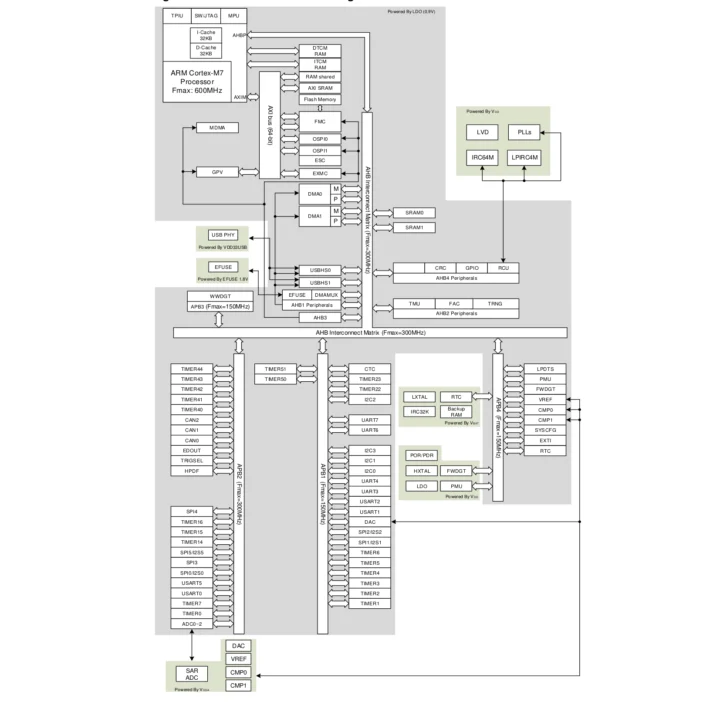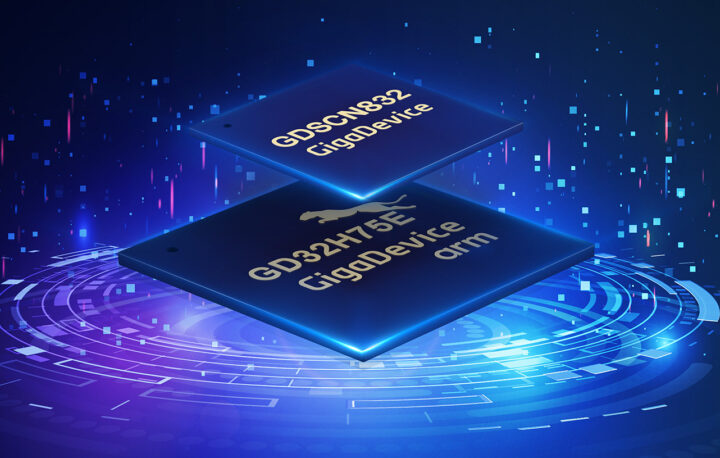GigaDevice has launched its first EtherCAT SubDevice Controller with the GDSCN832 along with the 600 MHz GD32H75E Arm Cortex-M7 microcontroller series which incorporates the EtherCAT SubDevice Controller.
The GH32G57E microcontroller also comes with 1024KB SRAM, 3840 KB flash with protection, up to two Ethernet PHY, USB Full Speed and High-Speed interfaces, and a range of peripherals and timers. Both products are made for the industrial automation market and are suitable for servo control, variable frequency drives, industrial PLCs, and communication modules.
Gigadevice GD32H75E specifications:
- CPU – Arm Cortex-M7 32-bit processor core operating at 600 MHz frequency
- Memory and Storage
- 512KB AXI SRAM
- 512KB RAM shared (ITCM/DTCM/AXI) memory
- 3840 KB on-chip Flash memory with security protection to prevent illegal code/data access
- External memory controller (EXMC) for SRAM, PSRAM, ROM, and NOR Flash
- Accelerator – Filter arithmetic accelerator (FAC) and Trigonometric Math Unit (TMU)
- Industrial communication
- 2x Ethernet PHYs (YMJ6 parts only)
- EtherCAT subdevice controller (ESC)
- 2x internal phy ports and 1x external MII
- 8x Fieldbus Memory Management Units (FMMUs)
- 8KB DPRAM
- Distributed clock 64-bit, support allows synchronization with other EtherCAT devices
- 8x Syncmanager entities
- DC synchronization less than 1us
- 2x internal phy ports and 1x external MII
- Motion control features
- Encoder divide output controller (EDOUT)
- High-performance digital filter module (HPDF) for external Σ-Δ modulators and EDOUT
- Encoder divide output controller (EDOUT)
- Other Peripherals
- Up to 6x SPI, 1x OSPI, 4x I2C, 116x GPIO
- Serial – 4x USART, 4x UART, 3x CAN-FD
- Audio – 4x I2S (multiplexed with SPI interfaces)
- USB – 1x USB 2.0 OTG FS, 1x USB 2.0 OTG HS
- Analog
- 2x 14-bit 4 MSPS ADCs with up to 22 channels
- 12-bit 5.3 MSPS ADC with up to 15 channels
- 12-bit DAC
- 2x comparators
- Timers
- Up to 10x general 16-bit timers
- 2x 16-bit PWM advanced timers,
- 4x 32-bit general timers
- 2x 32-bit basic timers
- 2x 64-bit basic timers
- 2x Watchdogs
- RTC
- Supply Voltage – 1.71V to 3.6V
- Package – BGA240 (YMJ6 models) or BGA240 Bypass (YMJ6B models)
- Temperature Range
- -40 to +85°C for grade 6 devices
- -40 to +105 °C for grade 7 devices

As you may have noticed from the specifications two BGA240 package models are available one with two internal Ethernet PHY and the other using bypass mode to meet the application needs of various customers. GigaDevice provides datasheets, user manuals (TRMs), and application notes for the GD32H75E EtherCAT MCU and GDSCN832 EtherCAT sub-device controller.
The Cortex-M7 microcontroller is supported through the free GigaDevice GD32 IDE and debugging & programming tools like GD-LINK and GD32 All-In-One Programmer. Arm KEIL, IAR, and SEGGER also offer full support for the GD32H75E MCU. None of this is shown on the product page, but the GD32MCU website has documents and resources specific to the GD32H75E as can be seen in the screenshot below.
What I’m unable to find is more details about GD32H75E evaluation kits or development boards, even though the company claims samples and development boards are available now. I do see one reference to the GDSCN832R_EVAL board on the GD32MCU website, so that might be what they mean. Some other EtherCAT solutions we’ve covered include Renesas RZ/T2H Cortex-A55/R52 industrial MPU and RZ/T2H-EVKIT development board, ICOP QEC-M-01 master EtherCAT controller, and NXP i.MX 94 octa-core Cortex-A55/M33/M7 processor among others
Mass production of the new EtherCAT microcontrollers is scheduled for Q2 2025. A few more details may also be found in the press release.
Thanks to TLS for the tip.

Jean-Luc started CNX Software in 2010 as a part-time endeavor, before quitting his job as a software engineering manager, and starting to write daily news, and reviews full time later in 2011.
Support CNX Software! Donate via cryptocurrencies, become a Patron on Patreon, or purchase goods on Amazon or Aliexpress






